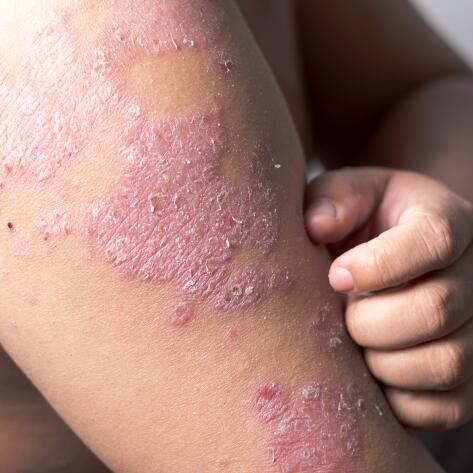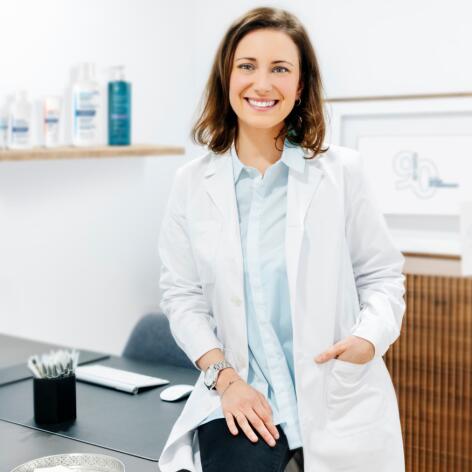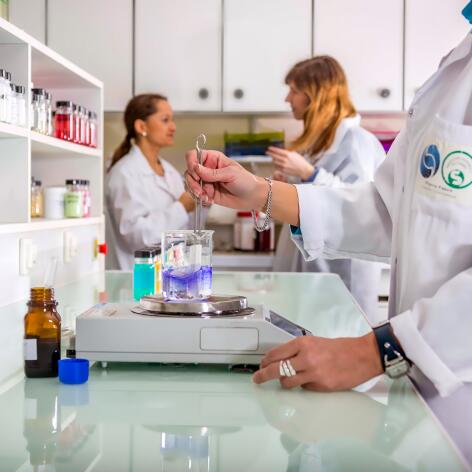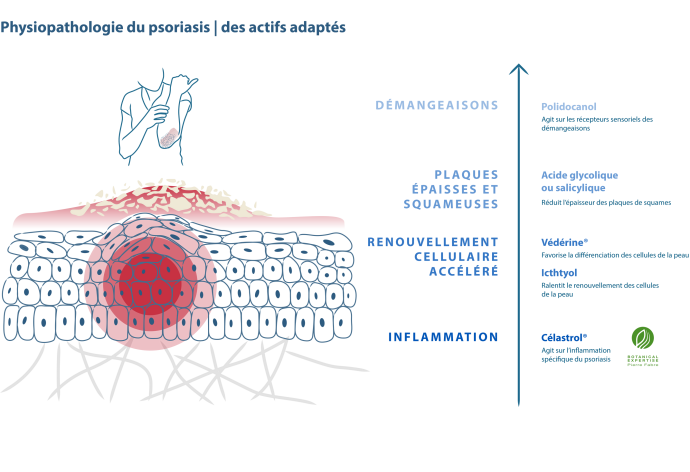Psoriasis
While current treatments help make psoriasis symptoms go away for a while, they do not completely cure it. For these reasons, we are working to develop innovative, well-tolerated treatments that are suitable for use during and after treatment, and that help to space out flare-ups. At the same time, we are working to provide information and support materials for patients so that they can learn to live better with this disease.
- 3%
Psoriasis affects about 3% of the world's population¹
- 30%
of psoriasis cases are genetic in origin²
At Ducray Dermatological Laboratories, for over 90 years, we have been committed to improving the quality of life of people with skin and scalp problems.
In order to bring you truly useful and innovative skin care routines, we take a comprehensive approach to pathologies, from clinical symptoms to psychological and physical impacts. And to provide even more effective solutions, we have put in place an uncompromising process that fully involves patients and dermatologists in our discussions.
This is how we develop safe, effective, easy-to-apply and perfectly tolerated products to better manage dermatological disorders, including psoriasis.
Psoriasis is a chronic inflammatory dermatological disease, which may have a genetic origin. It can occur as a skin and/or joint disease. The most frequent skin lesions are red plaques and flakes (small pieces of skin that peel off) that can be accompanied by significant itching in the skin folds, areas of friction or the scalp. This itching is not necessarily confined to the plaques, but can affect the whole body. The nails may also be affected. In the case of joint psoriasis, inflammatory pain may be present in the phalanges of the hands and feet, as well as the heels, knees, hips and elbows. The two forms can coexist. Psoriasis is linked to an immune system dysfunction. It progresses in flare-ups that are favored by various factors: infections, microtrauma, stress, medicinal treatments, etc.
Psoriasis is particularly uncomfortable both physically and psychologically. This pathology has a significant impact on the personal, social and professional well-being of patients. Stress, discomfort and anxiety are both contributing factors and consequences of flare-ups, thus creating a vicious cycle around the condition. "The burning is what is most painful for me. I would just like everything to go away, the physical symptoms, the pain... and the unattractive appearance," Ingrid told us during the focus group we conducted in May 2019.
Patients are offered topical treatment with corticosteroids or vitamin D. In the most severe cases, systemic oral, injection or IV treatments are used. Phototherapy or hydrotherapy treatments can also help. However, if currently available treatments help to make the symptoms disappear for a period of time, they cannot completely cure psoriasis.
For these reasons, we are working on the development of innovative care products that are perfectly tolerated and adapted for use during and after treatment, and that help to reduce the frequency of flare-ups. At the same time, we are committed to providing information and support materials for patients so that they can come to terms with this disease and learn to live better with it.
1.Sala M. et al., Advances in psoriasis physiopathology and treatments: Up to date of mechanistic insights and perspectives of novel therapies based on innovative skin drug delivery systems (ISDDS). Journal of Controlled Release: 2016
2.Griffiths, Christopher E M et al. “Psoriasis.” Lancet (London, England) vol. 397,10281 (2021)
You are at the heart of our approach
Who better than you to tell us about the symptoms observed, the sensations perceived, the progress noted? Who, more than you, could enlighten us on the questions you ask yourselves, the repercussions on your morale and the consequences for your daily life?
Understanding your needs and expectations:
In 2019, a study was conducted by our teams with 18 patients to understand the difficulties encountered at the onset of psoriasis, the feelings and discomfort experienced on a personal, social and professional level. In addition, an online community was created for a week: 22 participants were able to speak out about their disease, generating 773 posts.
These exchanges have enabled us to better understand your behavior in the face of psoriasis: loss of self-confidence, fear of passing the disease on to your children, changes in habits, the search for product solutions, psychological support, managing flare-ups, etc. All these doubts and characteristic reactions are taken into account in order to accompany you with the right care and support.


Playing YouTube videos requires the use of cookies in order to offer you targeted advertising based on your browsing For more information, please visit YouTube's « cookie » policy.
You have rejected Youtube's cookies and therefore you cannot view the video.
You can change your choices by clicking on « Cookie Settings » and accept Youtube's cookies to enable the video.
You can change this setting and withdraw your consent at any time.
"When I have big itchy flare-ups, it's vital that I soothe my skin very quickly, otherwise I have awful nights."
The most embarrassing thing is questions from other people, because they don't know about the disease, these visible and unattractive plaques scare them, and they often think it's contagious.
"As soon as you accept it, when you learn not to be ashamed anymore, not to necessarily want to hide it, you gain this sense of relief and the flare-ups happen less often."

Playing YouTube videos requires the use of cookies in order to offer you targeted advertising based on your browsing For more information, please visit YouTube's « cookie » policy.
You have rejected Youtube's cookies and therefore you cannot view the video.
You can change your choices by clicking on « Cookie Settings » and accept Youtube's cookies to enable the video.
You can change this setting and withdraw your consent at any time.
Co-creating care with you
Our desire to provide better care for psoriasis has led us to include you in our discussions and work groups. Our range of tailor-made products is the result of the close dialogue we have with you.
Thanks to the attention paid to the personal experiences of nearly 40 psoriasis patients, we were able to, for example, respond to your desire for:
- innovative and effective care products;
- care products with a pleasant texture and smell;
- quick and straightforward routines;
- an information and sharing platform providing access to expert content, patient and dermatologist videos and a forum for discussion.
Your involvement at every stage of product development is a powerful driving force that constantly pushes us towards excellence and innovation. It is very useful to us and is a real help to the researchers behind each of the advances made by Ducray Dermatological Laboratories in the field of psoriasis.


Playing YouTube videos requires the use of cookies in order to offer you targeted advertising based on your browsing For more information, please visit YouTube's « cookie » policy.
You have rejected Youtube's cookies and therefore you cannot view the video.
You can change your choices by clicking on « Cookie Settings » and accept Youtube's cookies to enable the video.
You can change this setting and withdraw your consent at any time.

Playing YouTube videos requires the use of cookies in order to offer you targeted advertising based on your browsing For more information, please visit YouTube's « cookie » policy.
You have rejected Youtube's cookies and therefore you cannot view the video.
You can change your choices by clicking on « Cookie Settings » and accept Youtube's cookies to enable the video.
You can change this setting and withdraw your consent at any time.
"I hope to find a product in cream form, that isn't too greasy, and that I can apply on a daily basis and that can provide relief, that doesn't stain my clothes, that is easy to use and affordable."
HEALTH PROFESSIONALS, KEY PARTNERS
Working in close collaboration with internationally renowned researchers and dermatologists allows us to supplement our thinking, accelerate our research and enrich our expertise.
The key to this approach:
- the selection of high-performance active ingredients;
- the creation of new solutions;
- the development of adapted routines;
- the development of pleasant galenics that facilitate the application and penetration of active ingredients.
In collaboration with Professor Jean François Nicolas, dermatologist, professor of Immunology and head of the Allergology and Immunology Research Department at Lyon hospitals, we have developed a pioneering range: Kertyol PSO. This new generation of skin care products takes a comprehensive approach to caring for psoriasis-prone skin and scalp: from body cleansing to the treatment of plaques, including daily hydration.

Our expertise on psoriasis
Our teams are constantly on the lookout for new scientific developments and have carried out numerous clinical and pharmacological studies and participated in international congresses and symposiums, enabling us to publish in leading scientific journals such as the European Journal of Dermatology (EJD) and the Journal of the European Academy of Dermatology and Venereology (JEADV).
Our approach is based on a review of recent articles that show that the entire skin is affected by psoriasis, including areas that do not have lesions; hence the need for comprehensive skin care to delay the onset of new plaques. In addition, our KERTYOL PSO range was co-designed with patients in working groups. This dual approach, both scientific and patient-centered, allows us to better meet the expectations of psoriasis sufferers.


KERTYOL PSO: an innovative combination of active ingredients
Celastrol® is a patented* anti-inflammatory active ingredient that helps slow the appearance of plaques and improve skin quality. Celastrol®, used for the first time in dermo-cosmetics, is an active ingredient that is present in small amounts in the roots of a Southeast Asian plant, trypterigium wilfordii. In order to increase the yield of the active ingredient without impacting the environment, the biotechnology teams at Ducray Dermatological Laboratories have developed an innovative plant cell culture process.
*Patent pending
Polidocanol soothes itching.
Glycolic and salicylic acids promote the disappearance of dry, thickened plaques that accumulate on the skin surface.
Ichtyol slows down cell renewal, which is accelerated in the case of psoriatic skin.
Vederine® promotes cell differentiation. It allows cells that have been renewed too quickly to differentiate and detach from the skin.
Effective routines
The KERTYOL PSO skin care range treats the problems that cause psoriasis with two simple routines: one dedicated to the skin and the other to the scalp. The objective: to promote the elimination of existing plaques and prevent the appearance of new ones. Because psoriasis is a chronic disease that requires regular care, our experts have also ensured the galenic formulas of these products are pleasant and easy to use on a daily basis.
Psoriasis-prone skin is particularly vulnerable, so we have conducted a complete program of clinical studies to ensure the efficacy and perfect tolerance of these products, whether they are used alone or in combination with a medicinal treatment.
From 8 days, KERTYOL PSO balm reduces pruritus by 39% and skin dryness is reduced by 47% after one month of use
KERTYOL PSO shampoo reduces the thickness of psoriasis plaques by 78% after one month of use and improves quality of life by 79%
WOULD YOU LIKE TO BETTER UNDERSTAND PSORIASIS?
The diagnosis of psoriasis is based on 3 criteria that enable the evaluation of its severity and the tailoring of treatments:
1) The appearance and extent of the lesions
Depending on the type of psoriasis, the plaques will be more or less extensive. They may be rare and located in the skin folds or on the scalp. Or they may cover the whole body. The percentage of skin surface affected, the degree of redness, the thickness of the plaques are all data that can be used to evaluate the degree of severity of psoriasis.
DID YOU KNOW?
Psoriasis plaques are the result of a pathophysiological mechanism that disrupts the immune system, triggering an inflammatory cascade and the proliferation of keratinocytes, the main cells on the skin's surface.
Although it is particularly visible on these plaques, psoriasis is actually present everywhere on the skin
2) The location of the lesions
Lesions on the limbs, in the skin folds, in areas of friction (e.g., knees, elbows) or on the scalp are typical.
Psoriasis sometimes presents as joint pain, known as psoriatic arthritis. This form can appear before, during or after the skin lesions.
In France, more than 50% of people with psoriasis have a scalp injury.
Scalp psoriasis
France Psoriasis Association, 2016.
Available from: https://francepsoriasis.org/lassociation/documentation/fiches-conseil/psoriasis-du-cuir-chevelu
3) The impact on the patient's quality of life
In addition to the difficulty of living with itchy, burning skin on a daily basis, the appearance of red, irritated and flaky skin is difficult to accept and can be a source of shame. Fear of stigmatization, psychological fatigue, fear of being contagious or of transmitting the pathology to your children... the influence of psoriasis on patient quality of life must be taken into account as stress and anxiety tend to make flare-ups worse, thus contributing to a vicious cycle.
84% of psoriasis patients report experiencing discrimination or humiliation3
3. Armstrong A. et al. Patient perceptions of clear/almost clear skin in moderate-to-severe plaque psoriasis: results of the Clear About Psoriasis worldwide survey. J Eur Acad Dermatol Venereol JEADV. déc 2018
Would you like to know more about psoriasis? Go to the dedicated page.
DUCRAY, A COMMITTED BRAND
Following in the footsteps of Albert Ducray, our teams are focused on a precise objective: to be truly useful to you.
To do this, we understand that it is together that we strengthen the relevance of our research and succeed in creating care that improves your quality of life.
Our mission goes even further:
- We are committed to 14 patient associations around the world - 9 of which are dedicated to psoriasis - by supporting their initiatives (discussion groups, conferences, awareness campaigns), by sponsoring their meetings and webinars or by contributing to their projects (financial or in-kind donations):
- Since 2021, we have been partnered with the France Psoriasis Association, which has more than 16,000 members. Our common goal: to improve patient care and give hope to all patients and their families. In this context, we have committed to donating €1 to the France Psoriasis Association every time a KERTYOL PSO balm is purchased, which should result in a donation of €10,000 to the association.

- We are also partnered with the PSO Portugal association. For all members of the association, a 20% discount is granted in all points of sale in the country in order to promote better access to care. The association's logo on the products in the KERTYOL PSO range allows each patient to easily identify the products adapted to their condition. The presence of the logo is also recognition of the reliability and effectiveness of Ducray products in the treatment of psoriasis.

- We are committed to offering quality products : It is essential for us to regularly collect patients' opinions on the efficacy of our products in order to continue to improve them and to offer the most appropriate care for their needs. In 2021, 500 patients received products from the KERTYOL PSO range accompanied by an explanatory booklet. A questionnaire also gave them the opportunity to provide information on their form of psoriasis, as well as their opinion on the efficacy of Ducray products.
- We are committed to the dermo-cosmetics of the future :
By participating in the Conscious Care collective movement. With the brands of the Pierre Fabre Group, we are working for the environment, eco-design, naturalness, scientific progress and better living.
It is through all these actions that, every day, we contribute to improving the quality of life of patients.
ALL ABOUT PSORIASIS
- What is psoriasis?
- What causes psoriasis?
- The symptoms of psoriasis
- Areas affected by psoriasis
- Psoriasis treatments
- Living daily with psoriasis

Dermatological expertise
To better understand your skin and hair, discover our exclusive content and innovative care products designed to improve your quality of life..
